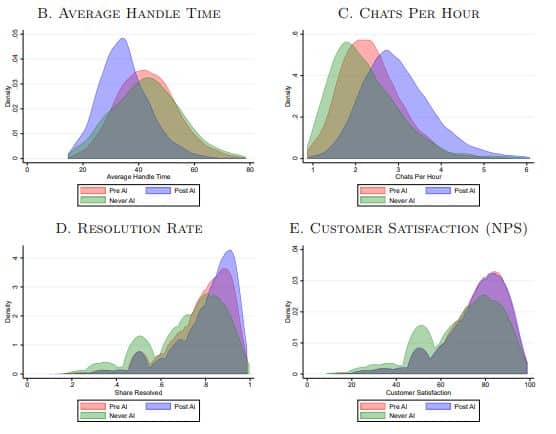MIT: AI Will Boost Your Employees’ Productivity by 35%

In Brief
Recent research shows that generative AI has the potential to increase production by up to 35% and reduce the time employees spend on tasks by up to 14%.
The findings come from joint research conducted by MIT and Stanford specialists that evaluated the output of employees working with AI in the span of an hour.
Generative AI is emerging as a powerful tool that could boost productivity and improve employee performance. Recent research shows that it has the potential to increase productivity by as much as 35% and reduce the time employees spend on tasks by up to 14%.

| Read more: 10+ Best AI 3D Generators |
The findings come from joint research conducted by MIT and Stanford specialists that evaluated the output of employees working with AI in the span of an hour. The study, which focused on the performance of entry-level and low-skilled employees, revealed productivity could increase by up to 35%. Moreover, the study showed that employees with two months of work experience who used AI were more productive than those with six months of experience and no access to AI, highlighting the fact that AI is better able to support inexperienced employees in achieving productivity goals.
However, when tested on experienced staff, the impact of AI was minimal, and the vast majority of advanced tasks are still better suited to humans. That said, the use of AI can still provide enormous benefits in the tasks that can be automated. For example, the study showed that automated AI-driving administrative processes could take on the role of a manager and train new employees, freeing up valuable time and resources that can be allocated to other tasks within the business.

The implications of the study could revolutionize the way businesses operate, enabling them to see real tangible benefits. As advances in the development of AI continue, we could see increases in production, cost savings, and other benefits to productivity as employees partner with automated intelligence. OpenAI and the University of Pennsylvania have already conducted studies that look further into the impact of generative AI on the labor market and its potential applications.
AI technology seems to have a promising future in driving productivity, particularly among those who lack experience or those closer to the entry level. It is important, however, that organizations don’t put aside the importance of human experience and understanding of the task at hand.
Read more about AI:
Disclaimer
In line with the Trust Project guidelines, please note that the information provided on this page is not intended to be and should not be interpreted as legal, tax, investment, financial, or any other form of advice. It is important to only invest what you can afford to lose and to seek independent financial advice if you have any doubts. For further information, we suggest referring to the terms and conditions as well as the help and support pages provided by the issuer or advertiser. MetaversePost is committed to accurate, unbiased reporting, but market conditions are subject to change without notice.
About The Author
Damir is the team leader, product manager, and editor at Metaverse Post, covering topics such as AI/ML, AGI, LLMs, Metaverse, and Web3-related fields. His articles attract a massive audience of over a million users every month. He appears to be an expert with 10 years of experience in SEO and digital marketing. Damir has been mentioned in Mashable, Wired, Cointelegraph, The New Yorker, Inside.com, Entrepreneur, BeInCrypto, and other publications. He travels between the UAE, Turkey, Russia, and the CIS as a digital nomad. Damir earned a bachelor's degree in physics, which he believes has given him the critical thinking skills needed to be successful in the ever-changing landscape of the internet.
More articles

Damir is the team leader, product manager, and editor at Metaverse Post, covering topics such as AI/ML, AGI, LLMs, Metaverse, and Web3-related fields. His articles attract a massive audience of over a million users every month. He appears to be an expert with 10 years of experience in SEO and digital marketing. Damir has been mentioned in Mashable, Wired, Cointelegraph, The New Yorker, Inside.com, Entrepreneur, BeInCrypto, and other publications. He travels between the UAE, Turkey, Russia, and the CIS as a digital nomad. Damir earned a bachelor's degree in physics, which he believes has given him the critical thinking skills needed to be successful in the ever-changing landscape of the internet.






















































